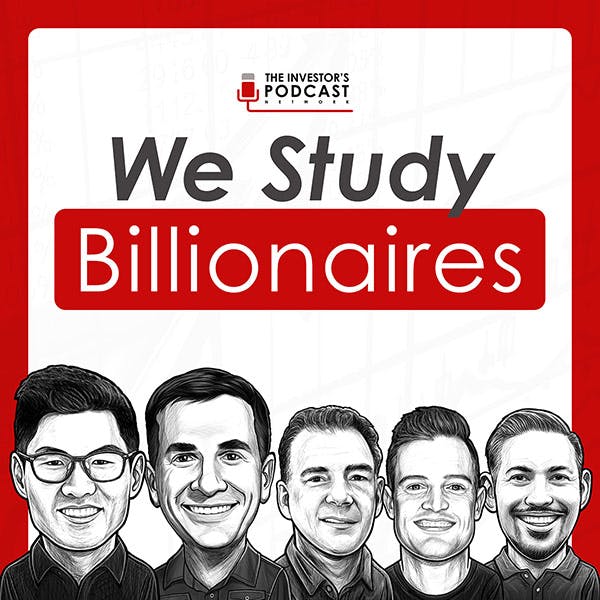
July 24, 2024 • 1hr 7min
BTC192 - Silicon Valley Mafia Holding the Elite’s Bitcoin w/ Mark Goodwin (Bitcoin Podcast)
We Study Billionaires - The Investor’s Podcast Network

Key Takeaways
- The article "The Chain of Custody: The Mafia Holding the Elite's Bitcoin" examines how intelligence-affiliated venture capital firms have dominated the financial technology industry, particularly in emerging markets.
- The concept of the "Bitcoin Dollar" system is compared to the petrodollar system, where artificial demand for US dollars is created through Bitcoin and stablecoins backed by US Treasuries.
- Entrepreneurial social groups like Endeavor have had significant influence in shaping emerging market economies and entrepreneurs, often funded by a small group with connections to organized crime and intelligence-backed venture capital.
- Companies like Xapo have played a key role in developing the infrastructure for the Bitcoin Dollar system through extreme security measures for custody and integration with the US regulatory environment.
- There are concerns about privacy and centralization of power with stablecoins and private bank digital currencies, which may perpetuate the US Treasury market and debt system.
- Alternative solutions like Lightning Network-based stable channels or algorithmic stablecoins not backed by Treasuries could potentially provide dollar-like instruments without perpetuating the current debt system.
- Bitcoin empowers both individuals and established financial players. The key is to build sustainable systems that truly empower people rather than perpetuate existing power structures.
Introduction
In this episode, host Preston Pysh interviews Mark Goodwin, author of "The Bitcoin Dollar" and co-author of the recent article "The Chain of Custody: The Mafia Holding the Elite's Bitcoin." They discuss the central themes of Goodwin's work, including the concept of "covert dollarization," the role of Bitcoin in disrupting or reinforcing the influence of venture capital and intelligence agencies, and the tokenization of dollars around the world.
Topics Discussed
The Bitcoin Dollar System (8:58)
Goodwin explains the concept of the "Bitcoin Dollar" system, drawing parallels to the petrodollar system:
- Just as the petrodollar created artificial demand for US dollars through oil sales, the Bitcoin Dollar system creates demand through Bitcoin and stablecoins.
- Stablecoin issuers are now major holders of US debt, creating a new mechanism for servicing US debt and maintaining dollar dominance.
- Key quote: "We've in effect created another demand for US dollars within this inflation into an energy commodity, into the pricing of a depegged energy commodity. So it used to be oil and now it's Bitcoin."
Endeavor and Entrepreneurial Social Groups (30:28)
The discussion turns to the role of entrepreneurial social groups like Endeavor in shaping emerging markets:
- Endeavor has significantly influenced entrepreneurship in Latin America, even introducing the concept of "entrepreneur" to the Spanish language.
- These groups are often funded by a small number of individuals with connections to organized crime and intelligence-backed venture capital.
- There are concerns about the true nature of "free market" development in these regions when influenced by such groups.
- Key quote: "When you look at that, these are people that are all funded by a very small group of people that have connections, significant connections, not just weak connections, but significant connections to organized crime and intelligence backed venture capital."
Xapo and the Infrastructure of the Bitcoin Dollar System (26:22)
Goodwin discusses the role of Xapo in building the infrastructure for the Bitcoin Dollar system:
- Xapo developed extreme security measures for Bitcoin custody, including putting keys in space and using advanced biometric systems.
- The company also integrated with the US regulatory environment, bringing large amounts of Bitcoin back under US jurisdiction.
- Xapo's infrastructure is now used by major players like Coinbase for ETF custody.
- Key quote: "Xapo really has created the Bitcoin Dollar system. Obviously, they don't affect regulations specifically, but then you go and you look at some of the biggest lobbyers in the country, and this is what part two is going to be about."
Stablecoins and Privacy Concerns (43:54)
The conversation addresses concerns about stablecoins and private bank digital currencies:
- While stablecoins may be seen as better than government-issued CBDCs, they still raise privacy and centralization concerns.
- Many stablecoin issuers have integrated with law enforcement and surveillance tools.
- There's a need for dollar-like instruments that don't perpetuate the US Treasury market and debt system.
- Key quote: "How can we create dollar instruments and do have this transitional period into a Bitcoin system? Is there a way to do it that doesn't perpetuate the US Treasury market?"
Alternative Solutions: Lightning Network and Algorithmic Stablecoins (51:17)
Goodwin and Pysh discuss potential alternatives to Treasury-backed stablecoins:
- Lightning Network-based "stable channels" could provide dollar-like instruments without touching the traditional financial system.
- Algorithmic stablecoins not backed by Treasuries could be another option, though there are challenges to overcome.
- The goal is to create systems that use Bitcoin as a reserve asset without perpetuating the current debt-based system.
- Key quote: "Let's build a system that doesn't kick the can down the road for the US government one more time. Let's not recreate the petrodollar system. Let's be clever. Let's write code, let's be cypherpunks."
The Dual Nature of Bitcoin's Empowerment (55:15)
Goodwin reflects on how Bitcoin empowers both individuals and established financial players:
- Bitcoin provides a trustless settlement system that can't be inflated away, which is revolutionary.
- However, this same technology can be used by both grassroots movements and established financial elites.
- The challenge is to build systems that truly empower people rather than perpetuate existing power structures.
- Key quote: "Bitcoin is a disinflationary system, eventually will be deflationary, and that's a state change of money. And so that's phenomenal. But it goes both ways."
Conclusion
The episode concludes with Goodwin emphasizing the importance of critical thinking and independent research:
- Readers and listeners are encouraged to examine source materials and form their own conclusions.
- The goal is to decentralize truth-finding rather than relying solely on trusted figures.
- Continued research and sharing of information is crucial as the financial system evolves.
- Key quote: "Trust me as far as you can throw me, which probably isn't super far. Look into the work itself... make your own conclusions and find your own research veins and then share them back with me."
Overall, the episode provides a deep dive into the complex relationships between venture capital, intelligence agencies, and the emerging Bitcoin-based financial system. It raises important questions about the future of money, privacy, and power dynamics in the digital age.









